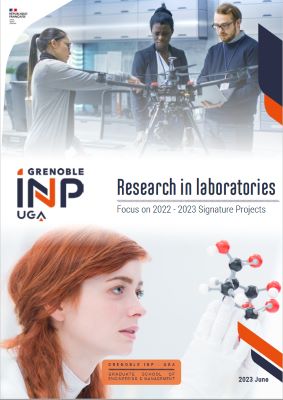
Overseen globally by the CNRS, this major programme involves Grenoble INP - UGA through its Grenoble INP - Pagora school and LGP2, responsible for coordinating the “papers and cardboards” research area***. Nathalie Marlin, lecturer at Grenoble INP – Pagora and researcher at LGP2, is responsible for this area at the school.
She and her colleagues from LGP2 and five other research centres all over France have chosen to focus their efforts on packaging. The consumption of packaging, and particularly cardboard has indeed shot up with the development of e-commerce. In France, nearly five million tonnes of paper and cardboard are recovered and reused every year. Packaging recycling technology, now mature, enables a reuse rate of 91% to be achieved. “In concrete terms, this means that on average, packaging contains 91% of recycled fibres”, says Marlin. “But there is still room for manoeuvre because the fibre extraction operation during recycling produces solid and liquid waste. These waste products, which account for 9% of the total matter, still contain fibres. If you consider the total tonnage, that still represents a non-negligible quantity!” Apart from fibres, aluminium and plastics can be recovered from food cartons, for example.
Recycle the starch from cardboards
The objective of the targeted project coordinated by LGP2 is not only to make the most of the products coming from paper and cardboard recycling, but also to reuse all of them. “For example, certain composites destined for contact with food are not recycled for the moment because they are contaminated by fats. We are, therefore, looking for another way of reusing them by developing chemical or thermo-conversion processes that will turn them into energy or into high added value chemical products and materials.”
Other developments are envisaged as part of this project, in particular recovery of the starch in cardboard that “glues” the cellulose fibres together, strengthening the cardboard’s mechanical properties. The starch, which is relatively expensive and represents about 20% of the total material, can be extracted from liquid waste and recycled using physicochemical methods. "This way we can kill two birds with one stone and use the starch, which causes problems for paper manufacturers when using recycled fibres, to make polymers and ethanol fuel,” said Marlin. Another solution would be to make cardboard without starch. To this end, researchers are developing fibres with improved functionality thanks to greater adhesion between them. The funds received through the PEPR will finance two theses and a post-doctoral study at Grenoble INP - UGA. In all the project brings together five theses and two postdoctoral studies.
Interactions with other PEPR research topics, particularly textiles and strategic metals, are envisaged as part of multidisciplinary projects.
* PEPR: Priority Research Programmes and Equipment, France 2030
** CNRS, UGA, Agefpi, Grenoble INP - UGA
*** The paper & cardboard research area will be inaugurated on November 30, 2023, at a Science Day open to all: https://lgp2.grenoble-inp.fr/fr/laboratoire/journee-scientifique-dinauguration
Partenaires du projet :
LGP2 Laboratoire de Génie des Procédés pour la Bioraffinerie, les Matériaux Bio-sourcés et l’Impression Fonctionnelles, UMR 5518, CNRS, UGA, Grenoble INP, Agefpi, Grenoble
RAPSODEE Centre de Recherche d'Albi en génie des Procédés, des SOlides Divisés, de l'Énergie et de l'Environnement, IMT Mines Albi, UMR CNRS 5302, Albi
CERMAV Centre de Recherches sur les Macromolécules Végétales, UPR CNRS 5301, Grenoble
CEMEF Centre de mise en forme des matériaux, CNRS UMR 7635, Mines Paris, PSL university, Sophia Antipolis
Institut Polytechnique UniLaSalle Transformations & Agro-ressources, ULR 7519, Beauvais
GEO Génie de l'Environnement pour les Organisations, CNRS UMR 5600 EVS (Environnement Ville Société)/MSE (Mines Saint-Etienne), Saint Etienne
MRI Management Responsable et Innovation, UR COACTIS (Conception de l’action en situation)/MSE (Mines Saint-Etienne), Saint Etienne



